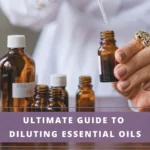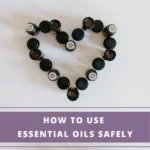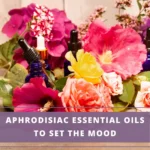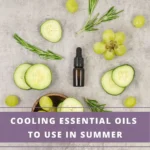As an Amazon Associate I earn from qualifying purchases. See Full Disclosure Here
Using natural remedies for seasonal allergies can help calm those painful symptoms and help you make the most of the beauty of spring.
Spring brings with it the promise of exciting times ahead with thoughts of spending more time outdoors thanks to the warmer weather, long strolls in the parks amidst rows of blooming flowers, and plenty of fresh produce in the local markets.
Unfortunately, that beautiful floral display is accompanied by an abundance of pollen, which can trigger off seasonal allergies.
For those who are prone to seasonal allergies, spending time outdoors can quickly turn into a painful experience as their symptoms flare up.

What Causes Seasonal Allergies?
Allergies are the result of an over-active immune response. Dust, pollen, and dust mites are common allergens that are not really harmful like pathogens are. But these same substances trigger an extreme immune response in those who are sensitive to them.
Spring allergies, also known as hay fever, are triggered by excessive tree and grass pollen. On the other hand, fall allergies are caused by ragweed pollen. Read more about the difference between spring allergies and fall allergies.
When pollen particles enter your body through your eyes, mouth, or nose, your immune system kicks into high gear. Immune cells start producing protein particles called antibodies. These antibodies pick up the pollen particles and transport them over to white blood cells, which immediately release histamines.
Histamines are a type of chemical that trigger distinctive allergy symptoms of sneezing, coughing, and phlegm, in an attempt to expel the pollen from your body. These symptoms persist as long as pollen continues to enter the body, or until the pollen sensitivity subsides.
From nonstop sneezing to itchy, watery eyes, inflamed skin, and headaches, allergy symptoms can make for an uncomfortable experience. And for those who are severely allergic, the symptoms can be downright painful.
If you know that your spring allergies are triggered by pollen, it may help to first learn how to allergy-proof your home against pollen.
Complement this with these tried and tested natural remedies for seasonal allergies, even before your symptoms start. This will help to prevent a severe flare-up of the symptoms. And with natural remedies, you don’t have to worry about any adverse reactions.
7 Natural Ways To Reduce Seasonal Allergies
1. Use Air Purifiers In The House
Using air purifiers in the house is one of the best natural ways to reduce seasonal allergies. Air purifiers work by removing airborne allergens from the indoor air.
During peak allergy season, pollen particles, which are very light, get airborne easily and can enter your home through open windows and doors.
When you get home, pollen particles stuck to your clothing, hair, and shoes also find their way indoors and settle down on all surfaces and the floor. These allergens can trigger pollen allergy symptoms when they’re disturbed.
Air purifiers work by pulling in the indoor air along with any airborne allergens in it. The airborne allergens such as pollen get trapped in a filter or a series of filters built into the air filter, preventing them from circulating in the indoor air.
HEPA filters, in particular, are known for their ability to trap the smallest airborne particles, including pollen
particles.
By using an air purifier with HEPA filter, you and your family will be able to breathe pollen-free air indoors, reducing your exposure and your allergy symptoms.
2. Consume Raw Honey
Raw honey is another very effective natural remedy for seasonal allergies. This is just one of many studies that highlight the potential use of honey as a remedy for allergic diseases.
The key is to consume raw honey and not the refined variety. Here’s why.
Pollen particles stick to the legs of honey bees as they dart about among the flowers. Some of these pollen particles get into the honey during the honey-making process.
Raw honey, which is not filtered or processed, still contains some of these pollen particles at relatively low levels. Exposure to these low levels of pollen in the raw honey lowers your body’s sensitivity to pollen, reducing the frequency and severity of your symptoms.
Besides soothing your current allergy symptoms, consuming raw honey all year round can also help shore up your tolerance to seasonal allergies. Benefits of Raw Honey and the difference between Raw Honey and Regular Honey.
The best raw honey available is Nature Nate’s 100% Pure & Unfiltered Raw Honey. This particular raw honey has received over 49,100 reviews on Amazon, most of which are over 4.5 stars.
Read my detailed Nature Nate’s Raw Honey Review to learn how to use it to calm seasonal allergies.
Caution – Never give raw honey to children under 1 year of age. Although rare, raw honey may contain botulism spores, which can lead to severe illness and even death in those under one year. This is because their immune system is not yet sufficiently developed to handle botulism.
3. Use Essential Oils
Using essential oils for allergies can also help. Read all about the best essential oils for allergies and how to use them.
4. Use A Neti Pot
A Neti Pot works to relieve seasonal allergies by flushing away those pollen particles from the nasal passages.
If you’ve never used a neti pot before, this article on what is a neti pot + how to use it may be a good place to start.
This article on how to use a neti pot for allergies and sinus relief goes into more detail on how to use it specifically to alleviate seasonal allergies.
5. Consume Apple Cider Vinegar
Apple cider vinegar is another effective natural remedy for seasonal allergies. Apple cider vinegar works by cleansing your lymphatic system and reducing mucus production, which helps to calm the coughing and sneezing that are symptomatic of spring allergies.
To get relief from seasonal allergies, mix a teaspoon of organic, unfiltered apple cider vinegar in a little bit of water and drink this at least two to three times a day.
Some things to keep in mind when using apple cider vinegar for seasonal allergies:
Always use organic, unfiltered ACV that still has the ‘Mother’ in it. The ‘Mother’ is what contains the beneficial bacteria that provide relief from seasonal allergies.
Read the list of ingredients on the label before buying. If the list does not say The ‘Mother’ look for another brand that does.
Apple cider vinegar has a strong taste. If you don’t take its strong taste, apple cider vinegar supplements and capsules work as just as well.
6. Increase Your Quercetin Intake
A natural bioflavonoid, Quercetin works to relieve seasonal allergies by stabilizing mast cells, which inhibit the release of histamines and reduce allergy symptoms. Quercetin is also a powerful antioxidant and helps to reduce inflammatory reactions that are typical in allergic reactions.
Garlic, onions, broccoli, and citrus fruits are rich in quercetin. However, you would need to eat large amounts of these foods to get the amounts of quercetin necessary to prevent allergies. To get relief from seasonal allergies, you may need to take Quercetin supplements.
Things to keep in mind when using Quercetin as a natural way to relieve seasonal allergies:
- Only use supplements from a quality source
- Start taking Quercetin supplements at least 4 to 6 weeks before allergy season as it takes a while to see the effects.
7. Eat Anti-Inflammatory Foods
Following an anti-inflammatory diet that includes foods such as broccoli, ginger, avocado, chia seeds, beetroot, pineapples, and nuts can do much to ease your allergies.
You want to avoid foods that tend to cause extra inflammation and might worsen seasonal allergy symptoms, including dairy, fried foods, corn oil, and processed foods.
Sticking to a diet mostly of clean and fresh ingredients will make a big difference in how you feel.
Have you tried any of these or some other natural remedies for your allergy symptoms? Which one did you find was most effective?
Related Reads:
12 Ways to Reduce Pollen Allergy Symptoms Naturally
Himalayan Salt Lamp Benefits For Seasonal Pollen Allergies
Reducing pollen allergy symptoms is one of 10 reasons for keeping a Himalayan salt lamp in your home

Disclaimer: This information is not intended to serve as medical advice. Please consult your doctor before using any natural medication or if you experience any unusual symptoms. See Full Disclaimer here.









